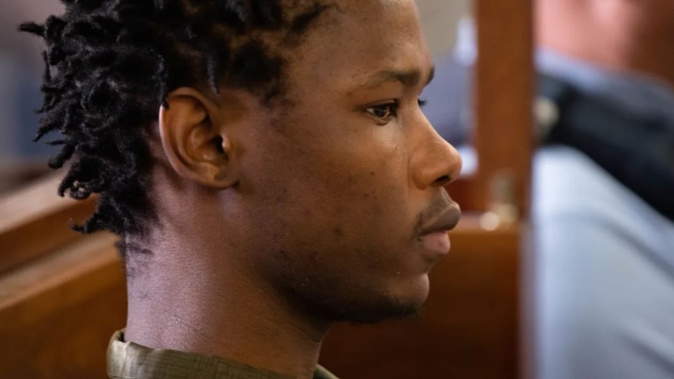
By Hamish Cardwell, Lauren Crimp, RNZ
Warning: This story discusses rape and sexual assault.
A Wellington musician convicted of rape can now be named as Martin Ditlhabi.
He was found guilty in November of one charge of rape in a retrial – after previously being cleared of other sexual assault charges – and sentenced to three years and nine months in prison.
The now 27-year-old was arrested after a raft of sexual allegations on social media.
Ditlhabi had lived in New Zealand since 2009, after he and his family emigrated from Botswana.
They first moved to Tauranga and later settled in Wellington where he went to high school.
During the first trial Ditlhabi testified he was targeted with death threats and racial abuse as part of the social media frenzy, and his lawyer later argued he should never be named because that would happen again.
But he was denied permanent name suppression in two courts, with the High Court ruling in May that revealing his name would not cause extreme hardship.
On Thursday his lawyer abandoned his attempt to keep his name secret forever.
What happened?
In 2020, numerous online accusations of rape and sexual assault were made.
The police kicked off an investigation dubbed Operation Emerald, which resulted in multiple police complaints, and Ditlhabi’s arrest.
It came to trial at Wellington District Court in October 2022, with six complainants testifying he had raped or sexually assaulted them, often in the context of a party, and with alcohol and drugs involved.
Ditlhabi pleaded not guilty to four charges of rape, two of unlawful sexual connection and two of indecent assault.
At trial, one of his lawyers Sam Campbell argued Ditlhabi was a victim of a “social media frenzy”, and Ditlhabi said he was “blindsided” by the online allegations
Later in the trial, Ditlhabi told the court through tears he had been subject to death threats and racist abuse from those social media messages. His house was broken into and he found spray paint all over the walls, including the word “rapist”.
This became the guts of his attempt to try to keep his name secret.
During the trials the basis of the defence’s argument was that the complainants either consented to sexual activity, or that Ditlhabi was not involved at all.
In the first proceeding the court heard all the alleged abuse occurred during or after partying. The defence argued the complainants’ and witnesses’ testimonies were hazy - given the time that had passed between the alleged abuse and trial, and that drugs and alcohol were involved.
But Crown lawyer Rushika De Silva said the complainants’ imperfect recall did not mean they were lying, or that their evidence was unreliable.
They had no reason to lie, she said.
The jury found him not guilty of the unlawful sexual connection and indecent assault charges – but could not reach a decision on the rape charges.
A retrial, a guilty verdict, and a bid for secrecy
The case was retried in November last year.
By that time, only two charges of rape were left, and several complainants did not return to testify, Stuff reported.
Ditlhabi was found guilty on one of those charges, and Judge Peter Hobbs sentenced him to three years and nine months in prison.
Judge Hobbs also refused Ditlhabi’s application for permanent name suppression - but kept suppression in place for a time, to allow him to appeal the decision.
That appeal was heard before Justice Helen McQueen at the High Court in Wellington in April.
Campbell argued revealing Ditlhabi’s name would re-ignite a social media “firestorm”, adding he had no support from friends or family, and he was still young, with prospects for rehabilitation if his name was kept secret.
But in her judgment in late May, Justice McQueen declined the appeal because it did not meet the threshold for “extreme hardship” which must be proven in order to grant name suppression.
The suppression was continued while Ditlhabi appealed that decision – but on Thursday he abandoned that appeal.
Who is Martin Ditlhabi?
Ditlhabi’s defence team gave a brief overview of Ditlhabi’s background during the first trial – information which was suppressed until now.
They said he makes music and has done modelling work, as well as worked in hospitality.
He was born in Botswana, where his parents are from, and he came with his family to New Zealand in 2009 when he was 11.
The family first lived in Tauranga, and when he was 16 they all moved to Wellington where he attended Rongotai College.
At school he played football, and started writing hip hop music.
He went to Paraparaumu College for his last year of schooling, leaving halfway through his final year.
He then moved to Wellington City and lived in several suburbs with a friend and his then-girlfriend.
SEXUAL HARM
Where to get help:
If it’s an emergency and you feel that you or someone else is at risk, call 111.
If you’ve ever experienced sexual assault or abuse and need to talk to someone, contact Safe to Talk confidentially, any time 24/7:
• Call 0800 044 334
• Text 4334
• Email [email protected]
• For more info or to web chat visit safetotalk.nz
Alternatively contact your local police station - click here for a list.
If you have been sexually assaulted, remember it’s not your fault.
– RNZ
Take your Radio, Podcasts and Music with you









